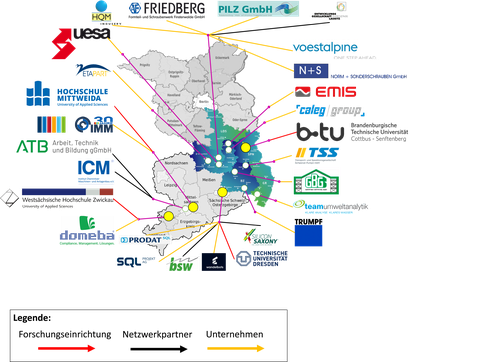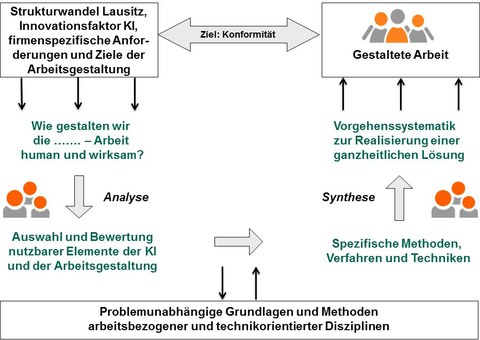PAL – PerspektiveArbeit Lausitz
Table of contents
Important data at a glance
| Project title: | PerspektiveArbeit Lausitz – Competence Center for the Work of the Future in Saxony and Brandenburg |
|---|---|
| Collaborative project: | yes |
| Subproject title: | PAL |
| Duration: | 11/2021 – 10/2026 |
| Funding: |
BMBF, "Innovations for tomorrow's production, services and work" program Funding measure "Future of Work: Regional Competence Centers of Labor Research. First round of competition: Design of new forms of work through artificial intelligence". |
| Processor / Contact person: | Dr.-Ing. Hajo Wiemer |
|
Cooperation: |
4 universities, 5 network partners, 18 companies (see Fig. 1) |
| Logline: | Four universities – BTU Cottbus, TU Dresden, Mittweida University of Applied Sciences and Westsächsische Hochschule Zwickau – and 23 companies and associations from Saxony and Brandenburg are pooling their expertise with the aim of making work in Lusatia effective, attractive and healthier through artificial intelligence (AI) systems. |

Fig. 1: Partners in the PAL project
Objective
Motivation
With the digitization of work, the demands on employees and the design of work processes are changing. This results in the need to consciously shape the change from a work design, socio-technical perspective and competence at an early stage. In order to put the currently existing discrepancy between work research, AI research as well as AI use in practice into perspective, the competence center to be established is to close research gaps with and for the participating companies and social partners in Lusatia on this topic, to create adequate transfer structures and, in doing so, to create practical humane and effective solutions of AI applications for the participating companies.
Solution approach
The aim of the joint project is to enable companies located in Lusatia to increase their competitiveness and flexibility by means of AI solutions designed to be humane. The work research anchored in the project ensures motivating and healthy activities and increases the attractiveness for employees.
The interdisciplinary competence center PerspektiveArbeit Lausitz (PAL) will strengthen regional application research and intensify knowledge and technology transfer in Lusatia through its regional demonstration centers as well as its continuing education activities, thereby creating nuclei for new centers of application research in the region. Based on a system concept for the symbiosis of people, plants and the working environment using AI methods, existing systems and processes are to be combined with sensor technology and data to enable the detection of environmental factors and their influence on people in the working environment (avoidance of hazards and stresses through AI-based decision recommendation).
With the help of recognized methods of labor research and the recorded data, for example, an AI-based worker assistance system is to be enabled to provide workers in the assembly area with assembly aids and recommendations for favorable workplace design. The AI-based worker assistance systems will be used to reduce production times through faster training of new employees or to reduce the need for paper manufacturing documents, thus advancing digitization. One application goal is the development and effective use of process mining using process-supporting software systems, artificial intelligence and integrated expertise to support machine operators.
Challenges
The chair for machine tool development and adaptive control systems is dedicated to the following focal points in PAL:
- Creation of demand-oriented qualification offers for different occupational and age groups in the economy.
- Methods for processing implicit knowledge for use in machine learning
- Transfer of the developed AI assistance systems into the working environment of selected company scenarios.
- Decision support system for the reduction of effort in work preparation for routine activities and for the acquisition of information for order planning
- Implementation strategy for user-oriented introduction and design of AI solutions for identified use cases to improve working conditions and facilitate work activities
- Use of small-data concepts and knowledge management concepts to master the diversity of variants in the creation and provision of work instructions for assembly personnel (in-house) and service technicians (on-site at the customer)
Solution approach
The solution paths are focus-specific:
- The development of demand-oriented qualification offers is based on the demand analysis in the companies networked in PAL, selects suitable example solutions from completed R&D projects as well as teaching contents of student training and transfers these to the needs of the targeted professional and age groups. Finally, continuing education events are held at the PAL Academy.
- The development of methods to capture and model experiential knowledge uses Design Science methods.
- The process model DMME (Data Mining Method for Engineering Applications) is used as a basis for the development of AI assistance systems for selected company scenarios.

Fig. 2: Solution cycle for achieving the objectives of the project
Results
Thus, the following results result from the work in PAL: Company-specific continuing education formats on the topic of AI applications in production technology, methods for capturing and modeling experiential knowledge, and selected case-specific AI solution concepts.
Contact
 © Michael Kretzschmar
© Michael Kretzschmar
Research associate
NameMr Dr.-Ing. Hajo Wiemer
Head of Ceramics Innovation Center
Send encrypted email via the SecureMail portal (for TUD external users only).
Chair of Machine Tools Development and Adaptive Controls
Visiting address:
Kutzbach-Bau, Room E6 Helmholtzstraße 7a
01069 Dresden

